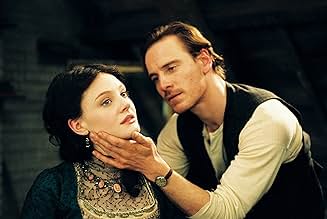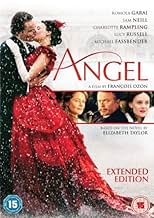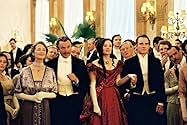Angel
- 2007
- Tous publics
- 2h 14min
NOTE IMDb
5,8/10
5,7 k
MA NOTE
L'ascension et la chute d'un jeune écrivain britannique excentrique au début du XXe siècle.L'ascension et la chute d'un jeune écrivain britannique excentrique au début du XXe siècle.L'ascension et la chute d'un jeune écrivain britannique excentrique au début du XXe siècle.
- Réalisation
- Scénario
- Casting principal
- Récompenses
- 1 victoire et 3 nominations au total
Geoffrey Streatfeild
- Sebastian
- (as Geoffrey Streatfield)
Avis à la une
A group of girls march in succession toward their daily lesson, both their step and their outfits similar in fashion, until one girl breaks from the mold and finds herself at the gates of paradise, forced to gaze from afar. The girl is Angel, the title character from French director, Francois Ozon's first venture into English-language film. Don't let the name fool you though; there is nothing remotely angelic about her. She is spoiled, loud and delusional everything you want in a heroine you're supposed to root for and just the kind of person you want to see get everything they desire. Right?
Angel is a writer, not a very good writer but people love her. She refuses to live in the real world in favor of the perfect illusion she believes she has crafted for herself. It all raises many questions about success and talent, sanity and vanity, but no matter how wickedly she is played by Romola Garai, the woman is too wretched to inspire sympathy in the viewer and Ozon does nothing to help.
Ozon's past efforts range in form from ridiculous and satirical to contemplative and tragic. His transition into the realm of period drama is daring considering the smaller size of his previous works but he juggles the elements well. In fact, he balances back and forth between the elaborate costumes, grandiose sets and exaggerated performances so well that it all feels rather plain. Considering how allergic Angel was to the mundane, I don't think she would have been very pleased with this. And trust me, you wouldn't like her mad.
Angel is a writer, not a very good writer but people love her. She refuses to live in the real world in favor of the perfect illusion she believes she has crafted for herself. It all raises many questions about success and talent, sanity and vanity, but no matter how wickedly she is played by Romola Garai, the woman is too wretched to inspire sympathy in the viewer and Ozon does nothing to help.
Ozon's past efforts range in form from ridiculous and satirical to contemplative and tragic. His transition into the realm of period drama is daring considering the smaller size of his previous works but he juggles the elements well. In fact, he balances back and forth between the elaborate costumes, grandiose sets and exaggerated performances so well that it all feels rather plain. Considering how allergic Angel was to the mundane, I don't think she would have been very pleased with this. And trust me, you wouldn't like her mad.
It starts quite strangely for a movie about the life of a romantic novel writer in the early XX century Britain, with a wannabe Danny Elfman's music, an ugly pink opening, and an actress obviously too old for the part she plays. But, as the movie goes on, if the strangeness still remains, all this elements begin to make sense and create and original, and I think, never experimented on screen, world. ANGEL is indeed a really good surprise if you manage to accept and enter the inner world that the movie describes, and the kitsch atmosphere of Ozon's style (witch was for me unbearable in his previous movies, like "8 Femmes", but that absolutely fits the subject of this movie). When I learned that Ozon directed a movie in English about a young artist, I was waiting for a sort of kitsch version of ESTER KAHN (the wonderful movie another French director Arnaud Despechin made about a young lady in Britain in the early XX century), but I couldn't be more wrong : ANGEL is a sort of feminine (or Gay) version of Tim Burton's ED WOOD, describing how a strong imagination no matter how bad it is can completely recreates the world, and how you can fully lives in a fantasy universe, when you believe hard enough in your talent and your art .
The movie tells us the life of Angel (Ramola Garai, who has everything to become the new Ludivine Sagner for François Ozon), from her childhood, where she dreams, upstairs the family's grocery, of the fastidious and glamorous life of a famous writer, to her success in the house of her dreams : Paradise house, where she has everything she ever dreamed of when she was young. The originality of this movie is that everything is seen with Angel's eyes. And her eyes only see what her imagination tells them to see, for she doesn't live in reality, but always fills it with dreams, so that she can live as if she were one of her romantic heroine. Whatever awful and sad the word might be, it never touches Angel, for she always transforms it with her imagination the way she wants. And imagination, she has plenty... Of course, her world is a childish, puerile and kitsch world of a bad Barbara Cartland 's novel and the movie completely recreates it on screen, with all the artifices it supposes : from the colors that explains the pink to the situations : when she proposes Esme, the man she chooses to love, the rain suddenly stops when he says yes, and a rainbow appears : empirical reality doesn't exist here, for Angel is unable to see it. But, and here's the all interest of the movie, the spectator, on the other hand, is absolutely able to watch it.
This tension between the strong believing that Angel puts in her world, and the ridiculous that the spectator sometimes sees in it, is mostly tangible thought other character's eyes (like Charlotte Ramplin is the more judgmental, she's the first to condemn Angel's books, but mostly for personal reasons : she can't stand the pretentious and rude young lady with whom her husband is falling in love, or Esme, the untalented painter, who is also one of this ambiguous character, for he accepts his wife universe, but is unable to really find his place in this fictive world). And the movie constantly plays with this two degrees, witch brings humanity, cruelties and sadness to the shinny but unreal world it describes. That's also why this movie is so surprising : we never know exactly where we are : is this a dream, when will it stops, will reality goes after it in the end ? This constant instability regenerates the spectator interest for this movie, and keep it far from the classical costumed movie about the rise and fall of an English women writer it could have been.
That's also why this movie reminds me of Tim Burton's ED WOOD, for, beyond their differences, they both deal with the same thematic of the triumph of an artistic imagination over the world, and the fall that fallows this triumph, and they also share a melancholic tone, as well as real understanding and compassion for untalented but passionate artists.
The movie tells us the life of Angel (Ramola Garai, who has everything to become the new Ludivine Sagner for François Ozon), from her childhood, where she dreams, upstairs the family's grocery, of the fastidious and glamorous life of a famous writer, to her success in the house of her dreams : Paradise house, where she has everything she ever dreamed of when she was young. The originality of this movie is that everything is seen with Angel's eyes. And her eyes only see what her imagination tells them to see, for she doesn't live in reality, but always fills it with dreams, so that she can live as if she were one of her romantic heroine. Whatever awful and sad the word might be, it never touches Angel, for she always transforms it with her imagination the way she wants. And imagination, she has plenty... Of course, her world is a childish, puerile and kitsch world of a bad Barbara Cartland 's novel and the movie completely recreates it on screen, with all the artifices it supposes : from the colors that explains the pink to the situations : when she proposes Esme, the man she chooses to love, the rain suddenly stops when he says yes, and a rainbow appears : empirical reality doesn't exist here, for Angel is unable to see it. But, and here's the all interest of the movie, the spectator, on the other hand, is absolutely able to watch it.
This tension between the strong believing that Angel puts in her world, and the ridiculous that the spectator sometimes sees in it, is mostly tangible thought other character's eyes (like Charlotte Ramplin is the more judgmental, she's the first to condemn Angel's books, but mostly for personal reasons : she can't stand the pretentious and rude young lady with whom her husband is falling in love, or Esme, the untalented painter, who is also one of this ambiguous character, for he accepts his wife universe, but is unable to really find his place in this fictive world). And the movie constantly plays with this two degrees, witch brings humanity, cruelties and sadness to the shinny but unreal world it describes. That's also why this movie is so surprising : we never know exactly where we are : is this a dream, when will it stops, will reality goes after it in the end ? This constant instability regenerates the spectator interest for this movie, and keep it far from the classical costumed movie about the rise and fall of an English women writer it could have been.
That's also why this movie reminds me of Tim Burton's ED WOOD, for, beyond their differences, they both deal with the same thematic of the triumph of an artistic imagination over the world, and the fall that fallows this triumph, and they also share a melancholic tone, as well as real understanding and compassion for untalented but passionate artists.
If I had approached this movie as a satire, perhaps it would have been more bearable. Or maybe not. It somewhat feels like a play on 40's-50's movie comedy, but set in the early 1900's. The script (and the acting for that matter) is so flawed, there is no need to even bother going over its flaws. Fassbender clearly lives in the 21st century and Romola is straight out of an overacted tragicomedy play from the 1800's, except she is behaving like a bratty teenager we see on Sweet 16. I hope she was doing it on purpose, otherwise there are no excuses for her annoyance. There is a fine line between funny and annoying. I had to force myself to finish watching this movie just because I am such a huge Fassbender fan. Him, along with Charlotte and Sam, what a waste of talent.
Hmmmm... if the reviews and comments I've seen are any indication, melodrama is as divisive as ever. I found Ozon's approach admirable: intelligent and objective but not satirically distanced, like Fassbinder without the cruelty. It seems clear to me that he is showing us not a realistic depiction of Angel's life but a version colored by her imagination. The intention is not to mock her but to allow us to share her experience, and to make up our own minds about the value of her fantasies. The closest to an authorial statement comes from the character least sympathetic to Angel: Charlotte Rampling as the publisher's wife comments that in spite of Angel's lack of talent or self-knowledge, she has to admire her drive to succeed. Of course we're not compelled to agree, but it strikes me as a fair assessment.
The reactions to this movie remind me of the uncomprehending dismissal of Sofia Coppola's Marie Antoinette, another story of a shallow, self-involved woman that insists on looking through her eyes. This kind of scrupulous generosity is in line with a tradition going back to Flaubert's Madame Bovary, and both directors have the stylistic confidence to carry it off. It may just be that they don't have the critics they deserve.
The reactions to this movie remind me of the uncomprehending dismissal of Sofia Coppola's Marie Antoinette, another story of a shallow, self-involved woman that insists on looking through her eyes. This kind of scrupulous generosity is in line with a tradition going back to Flaubert's Madame Bovary, and both directors have the stylistic confidence to carry it off. It may just be that they don't have the critics they deserve.
Angel Deverell (Romola Garai) imagines herself to be a writer. Night after night she writes of her imaginative world. At school, she is ridiculed for her fantasies, and her mother (Jacqueline Tong) has no idea of her talent. A London publisher Theo (Sam Neill), publishes her first book despite her arrogance and his reservations. The novel is a bestseller. She writes another and another and another, and so on.
At the height of her fame, she meets the painter Esmé (Michael Fassbender), and is immediately stuck, even if he is even more arrogant that she is. And, sad to say, more untalented.
This is the key to this film. It is a satire of those stories of the period. There are only two serious people in the film. The rest are caricatures of popular characters and settings.
British writer Elizabeth Taylor's novel, based upon Marie Corelli, a long-forgotten English novelist of the 19th Century, was translated to the screen by François Ozon (Swimming Pool, 8 Women), who also directed. He certainly captured the ego Corelli was reputed to have.
The life she lived or the life she dreamed? That is the question of this film. There is no doubt that for a few brief moments, Angel was never in touch with reality. It makes for great satire.
At the height of her fame, she meets the painter Esmé (Michael Fassbender), and is immediately stuck, even if he is even more arrogant that she is. And, sad to say, more untalented.
This is the key to this film. It is a satire of those stories of the period. There are only two serious people in the film. The rest are caricatures of popular characters and settings.
British writer Elizabeth Taylor's novel, based upon Marie Corelli, a long-forgotten English novelist of the 19th Century, was translated to the screen by François Ozon (Swimming Pool, 8 Women), who also directed. He certainly captured the ego Corelli was reputed to have.
The life she lived or the life she dreamed? That is the question of this film. There is no doubt that for a few brief moments, Angel was never in touch with reality. It makes for great satire.
Le saviez-vous
- AnecdotesThe story is inspired by the life of Marie Corelli.
- Citations
Angel Deverell: [from trailer] Everyone told me my dreams were lies. All I wanted was to make it true.
- ConnexionsReferenced in Une nouvelle amie (2014)
Meilleurs choix
Connectez-vous pour évaluer et suivre la liste de favoris afin de recevoir des recommandations personnalisées
- How long is Angel?Alimenté par Alexa
Détails
Box-office
- Budget
- 14 900 000 € (estimé)
- Montant brut mondial
- 2 835 903 $US
- Durée2 heures 14 minutes
- Couleur
- Mixage
- Rapport de forme
- 1.85 : 1
Contribuer à cette page
Suggérer une modification ou ajouter du contenu manquant




































